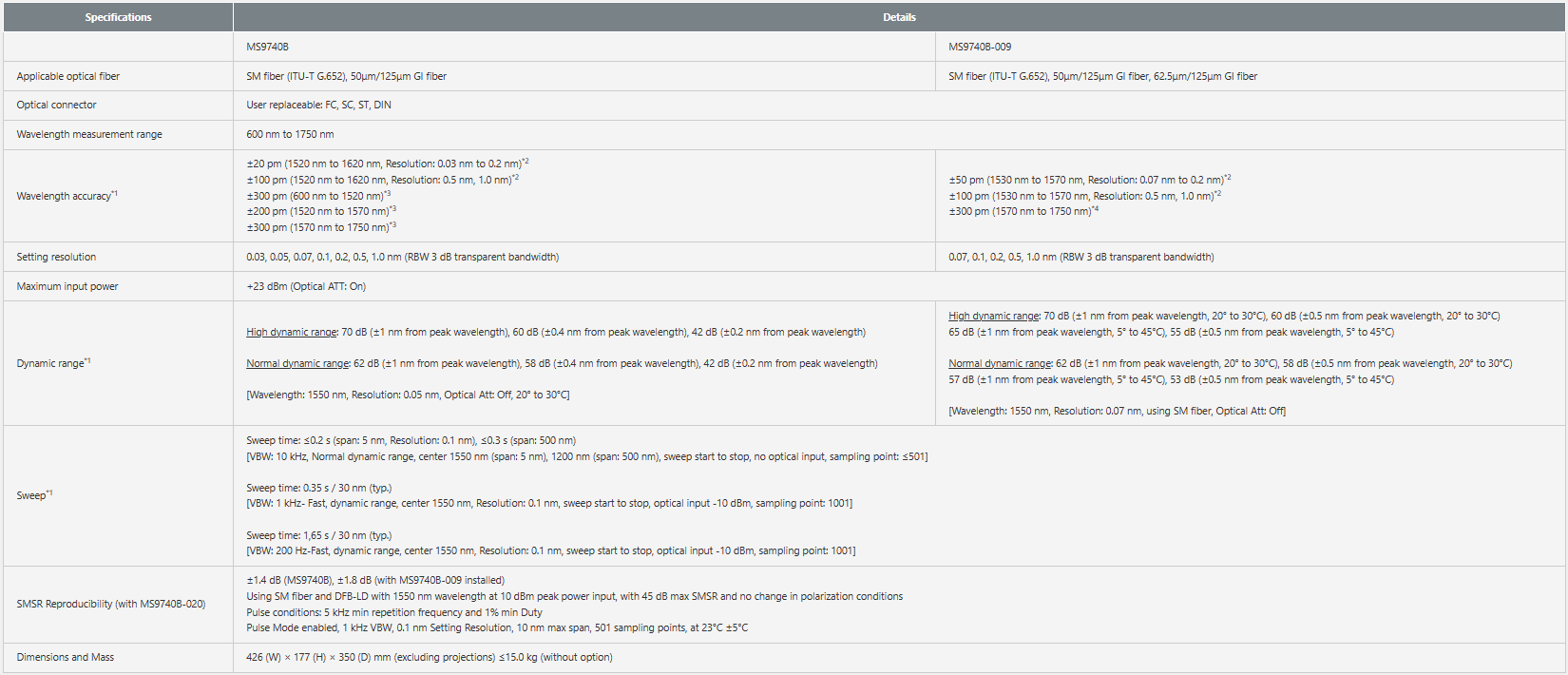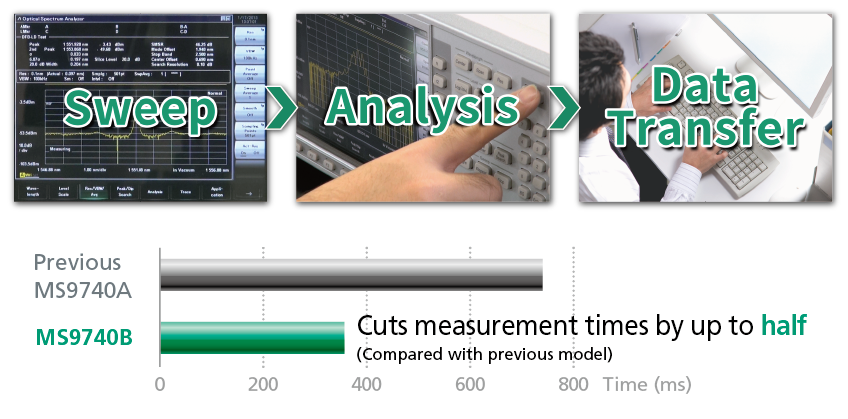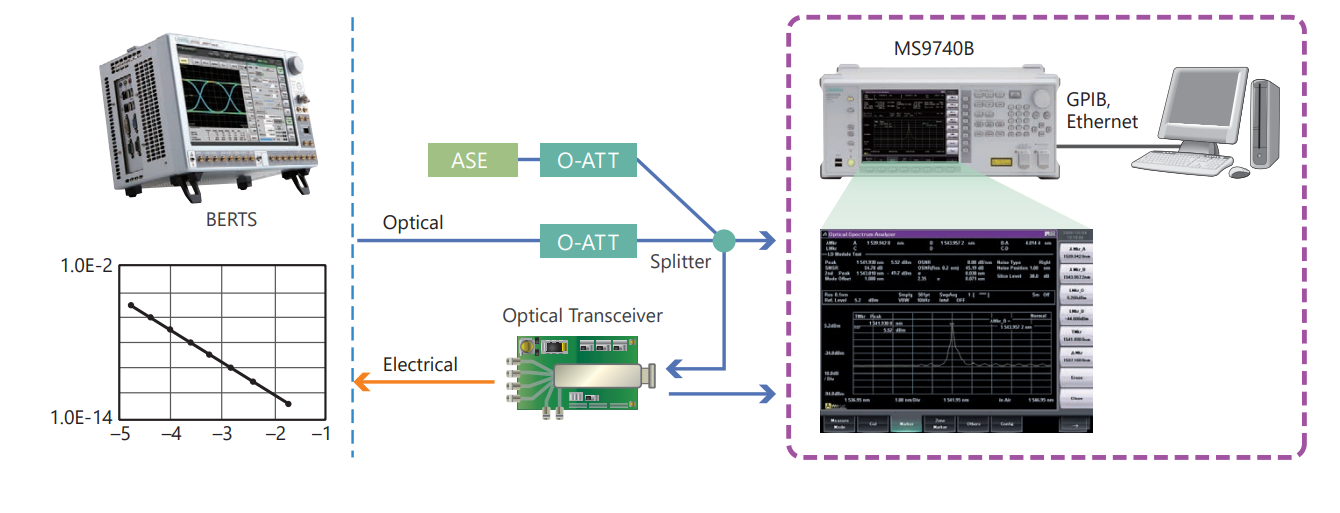About MS9740B Anritsu Anritsu Spectrum Analyser Essentials, Bookmark this post!
The MS9740B is a spectral analyser manufactured by Anritsu for measuring and analysing the spectral characteristics of light sources. The main parameters of the device include:
Configuration: benchtop 1.
Wavelength range: 600 to 1750 nm.
Wavelength resolution: 0.03, 0.05, 0.07, 0.1, 0.2, 0.5, 1.0 nm.
Wavelength Accuracy: ±20 to ±300 picomoles (pm).
Fibre mode: multimode.
Dynamic range: 42 to 70 decibels (dB).
Scan time: 0.2 to 1.65 seconds.
Optical power range: 23 decibels milliwatts (dBm).
In addition, the MS9740B supports an optical pulse measurement mode that is capable of capturing the spectrum of an LD without a trigger signal input.
In summary, the MS9740B is a powerful spectrum analyser suitable for a wide range of spectral measurement needs, and is particularly good at evaluating LD chips during production.

What is the market positioning and target user group of MS9740B Spectrum Analyser?
The MS9740B Spectrum Analyser is marketed primarily to the optical communications industry, which requires high accuracy, high speed and wide dynamic range. The target user groups include, but are not limited to, R&D personnel in the optical communications industry, engineers manufacturing and evaluating 850 nm band VCSEL modules, and professionals conducting optical research and development. The device supports multimode fibre inputs with a wavelength measurement range from 600 nm to 1750 nm, which meets the demand for improved quality of submarine cable communications, and enhanced high-power laser diode measurement capabilities, which help to improve the production efficiency of high-power LD chips. In addition, the MS9740B features a user-friendly interface that makes operation easier and more intuitive, making it suitable for research and development work that requires quick switching between desired measurement modes.27 Thus, it can be concluded that the MS9740B spectrum analyser is targeted at professionals who are engaged in high-performance, high-efficiency testing and R&D in the field of optical communications.
What are the main differences in performance and price between the MS9740B and other spectrum analysers in its class, such as the MS9740A or MS9740C?
The main differences in performance and price between the MS9740B and other spectrum analysers in its class, such as the MS9740A or MS9740C, are in the following areas:
Measurement processing time: The MS9740B halves the measurement processing time while maintaining the original functionality and performance.29 This means that the MS9740B performs the same task faster than the MS9740A, increasing productivity.
Measurement sensitivity: Despite its faster processing speed, the MS9740B overcomes the problem of reduced measurement sensitivity caused by faster processing speed. This indicates that the MS9740B improves processing efficiency while maintaining sensitivity to detail, ensuring highly accurate measurement results.
Functionality and size: The MS9740B maintains the same measurement sensitivity performance, functionality and size as its predecessor, the MS9740A. This means that users can enjoy faster processing speeds and improved performance at no extra cost.

Compared to the MS9740A, the MS9740B improves in performance mainly by shortening the measurement processing time and keeping the measurement sensitivity unchanged, while remaining consistent with the MS9740A in terms of functionality and size, with no mention of a direct comparison with the MS9740C. These improvements make the MS9740B a cost-effective spectral analyser in its class, suitable for application scenarios requiring fast processing and high-precision measurements. However, specific information about pricing was not explicitly mentioned in the information I searched for, so it is not possible to directly compare the MS9740B with other models in terms of price.
What are the latest technology or feature updates supported by the MS9740B?
The latest technology or feature updates supported by the MS9740B Spectrum Analyser include the Pulsed Light Measurement Option (MS9740B-020), which is specifically designed for evaluating pulsed laser diode (LD) chips. This update is designed to shorten the testing time of pulsed LD chips and help improve the productivity of high-power LD chips. In addition, although there is no direct mention of specific performance enhancements or technical details, I can infer from the information I have searched for that this update is significant in improving measurement speed and efficiency.
What are the specific use cases and effectiveness assessment of the MS9740B in LD chip evaluation?
Specific use cases of the MS9740B spectrum analyser for LD chip evaluation include enhancements to the measurement capabilities of external laser small form-factor pluggable (ELSFP) modules for co-packaged optics applications (CPOs).37 Additionally, Fleishman-Hillard has used the Anritsu MS9740B spectrum analyser for the development of an optical chip test system, which provides customers with fast and accurate spectral characterisation of optical chips and devices, meeting a wide range of rates. spectral characterisation tests to meet the needs of various rate optical communications. This demonstrates that the MS9740B Spectrum Analyser not only improves measurement efficiency, but also plays an important role in the testing of optical chips and optical devices, especially in the field of optical communications where high accuracy and speed are required.
In terms of effect evaluation, the MS9740B Spectrum Analyser is able to cut the evaluation time in half, dramatically improving the production line efficiency of active optical devices for 5G mobile and cloud services. This means that the MS9740B not only improves the speed of testing, but also supports the development and application of high-rate, high-precision optical communication technologies through its efficient performance. Therefore, it can be concluded that the use cases and evaluation of the effects of the MS9740B in LD chip evaluation show its significant contribution to improving measurement efficiency and promoting the development of optical communication technology.
What is the key information contained in the Maintenance and Operation Guide for the MS9740B?
The key information contained in the Maintenance and Operating Guide for the MS9740B can be summarised below from the information I have searched for:
Operator's manual version: the operator's manual version for the MS9740B Spectrum Analyser is v2.0, with a release date of 18 May 2023.42 This indicates that the operator's guide for the unit is up to date and may contain the latest features, safety guidelines and performance optimisation recommendations.
Installation and Maintenance Schemes: Although there is no direct reference to specific installation and maintenance schemes for the MS9740B, it can be inferred from the Anritsu Large Data Centre Installation and Maintenance Schemes that the MS9740B, as part of its support for confirming the quality of the optical modules, communications, and its maintenance and operation guide may address how to effectively install and maintain it in a large data centre environment.
Safety and environmental specifications: The mention of the MS9740B in the user guides and maintenance manuals provided by WorldStrong implies that the maintenance manuals for this equipment may contain important information about safe operation and environmental protection.
Product manual: The 336-page product manual for the Anritsu MS9740B Spectrum Analyser suggests that the operating and maintenance instructions are likely to be very detailed, covering a wide range of topics from basic operation to advanced features.
Cooling Technology and Reliability: Although this is a description specific to the E8403A, features such as the availability of innovative cooling technology, improved backplane design, high reliability, and ease of maintenance are mentioned. Although these features are specific to different devices, they reflect general principles of Anritsu product design, so it can be assumed that the MS9740B operation and maintenance manual may also emphasise these aspects.
Key information contained in the MS9740B's maintenance and operating instructions may include the latest version of the operating manual, installation and maintenance solutions for specific application scenarios (e.g., large data centres), safety and environmental specifications, detailed product brochures, and design principles that emphasise cooling technology, reliability, and ease of maintenance.
The MS9740B is a spectral analyser manufactured by Anritsu for measuring and analysing the spectral characteristics of light sources. The main parameters of the device include:
Configuration: benchtop 1.
Wavelength range: 600 to 1750 nm.
Wavelength resolution: 0.03, 0.05, 0.07, 0.1, 0.2, 0.5, 1.0 nm.
Wavelength Accuracy: ±20 to ±300 picomoles (pm).
Fibre mode: multimode.
Dynamic range: 42 to 70 decibels (dB).
Scan time: 0.2 to 1.65 seconds.
Optical power range: 23 decibels milliwatts (dBm).
In addition, the MS9740B supports an optical pulse measurement mode that is capable of capturing the spectrum of an LD without a trigger signal input.
In summary, the MS9740B is a powerful spectrum analyser suitable for a wide range of spectral measurement needs, and is particularly good at evaluating LD chips during production.

What is the market positioning and target user group of MS9740B Spectrum Analyser?
The MS9740B Spectrum Analyser is marketed primarily to the optical communications industry, which requires high accuracy, high speed and wide dynamic range. The target user groups include, but are not limited to, R&D personnel in the optical communications industry, engineers manufacturing and evaluating 850 nm band VCSEL modules, and professionals conducting optical research and development. The device supports multimode fibre inputs with a wavelength measurement range from 600 nm to 1750 nm, which meets the demand for improved quality of submarine cable communications, and enhanced high-power laser diode measurement capabilities, which help to improve the production efficiency of high-power LD chips. In addition, the MS9740B features a user-friendly interface that makes operation easier and more intuitive, making it suitable for research and development work that requires quick switching between desired measurement modes.27 Thus, it can be concluded that the MS9740B spectrum analyser is targeted at professionals who are engaged in high-performance, high-efficiency testing and R&D in the field of optical communications.
What are the main differences in performance and price between the MS9740B and other spectrum analysers in its class, such as the MS9740A or MS9740C?
The main differences in performance and price between the MS9740B and other spectrum analysers in its class, such as the MS9740A or MS9740C, are in the following areas:
Measurement processing time: The MS9740B halves the measurement processing time while maintaining the original functionality and performance.29 This means that the MS9740B performs the same task faster than the MS9740A, increasing productivity.
Measurement sensitivity: Despite its faster processing speed, the MS9740B overcomes the problem of reduced measurement sensitivity caused by faster processing speed. This indicates that the MS9740B improves processing efficiency while maintaining sensitivity to detail, ensuring highly accurate measurement results.
Functionality and size: The MS9740B maintains the same measurement sensitivity performance, functionality and size as its predecessor, the MS9740A. This means that users can enjoy faster processing speeds and improved performance at no extra cost.

Compared to the MS9740A, the MS9740B improves in performance mainly by shortening the measurement processing time and keeping the measurement sensitivity unchanged, while remaining consistent with the MS9740A in terms of functionality and size, with no mention of a direct comparison with the MS9740C. These improvements make the MS9740B a cost-effective spectral analyser in its class, suitable for application scenarios requiring fast processing and high-precision measurements. However, specific information about pricing was not explicitly mentioned in the information I searched for, so it is not possible to directly compare the MS9740B with other models in terms of price.
What are the latest technology or feature updates supported by the MS9740B?
The latest technology or feature updates supported by the MS9740B Spectrum Analyser include the Pulsed Light Measurement Option (MS9740B-020), which is specifically designed for evaluating pulsed laser diode (LD) chips. This update is designed to shorten the testing time of pulsed LD chips and help improve the productivity of high-power LD chips. In addition, although there is no direct mention of specific performance enhancements or technical details, I can infer from the information I have searched for that this update is significant in improving measurement speed and efficiency.
What are the specific use cases and effectiveness assessment of the MS9740B in LD chip evaluation?
Specific use cases of the MS9740B spectrum analyser for LD chip evaluation include enhancements to the measurement capabilities of external laser small form-factor pluggable (ELSFP) modules for co-packaged optics applications (CPOs).37 Additionally, Fleishman-Hillard has used the Anritsu MS9740B spectrum analyser for the development of an optical chip test system, which provides customers with fast and accurate spectral characterisation of optical chips and devices, meeting a wide range of rates. spectral characterisation tests to meet the needs of various rate optical communications. This demonstrates that the MS9740B Spectrum Analyser not only improves measurement efficiency, but also plays an important role in the testing of optical chips and optical devices, especially in the field of optical communications where high accuracy and speed are required.
In terms of effect evaluation, the MS9740B Spectrum Analyser is able to cut the evaluation time in half, dramatically improving the production line efficiency of active optical devices for 5G mobile and cloud services. This means that the MS9740B not only improves the speed of testing, but also supports the development and application of high-rate, high-precision optical communication technologies through its efficient performance. Therefore, it can be concluded that the use cases and evaluation of the effects of the MS9740B in LD chip evaluation show its significant contribution to improving measurement efficiency and promoting the development of optical communication technology.
What is the key information contained in the Maintenance and Operation Guide for the MS9740B?
The key information contained in the Maintenance and Operating Guide for the MS9740B can be summarised below from the information I have searched for:
Operator's manual version: the operator's manual version for the MS9740B Spectrum Analyser is v2.0, with a release date of 18 May 2023.42 This indicates that the operator's guide for the unit is up to date and may contain the latest features, safety guidelines and performance optimisation recommendations.
Installation and Maintenance Schemes: Although there is no direct reference to specific installation and maintenance schemes for the MS9740B, it can be inferred from the Anritsu Large Data Centre Installation and Maintenance Schemes that the MS9740B, as part of its support for confirming the quality of the optical modules, communications, and its maintenance and operation guide may address how to effectively install and maintain it in a large data centre environment.
Safety and environmental specifications: The mention of the MS9740B in the user guides and maintenance manuals provided by WorldStrong implies that the maintenance manuals for this equipment may contain important information about safe operation and environmental protection.
Product manual: The 336-page product manual for the Anritsu MS9740B Spectrum Analyser suggests that the operating and maintenance instructions are likely to be very detailed, covering a wide range of topics from basic operation to advanced features.
Cooling Technology and Reliability: Although this is a description specific to the E8403A, features such as the availability of innovative cooling technology, improved backplane design, high reliability, and ease of maintenance are mentioned. Although these features are specific to different devices, they reflect general principles of Anritsu product design, so it can be assumed that the MS9740B operation and maintenance manual may also emphasise these aspects.
Key information contained in the MS9740B's maintenance and operating instructions may include the latest version of the operating manual, installation and maintenance solutions for specific application scenarios (e.g., large data centres), safety and environmental specifications, detailed product brochures, and design principles that emphasise cooling technology, reliability, and ease of maintenance.








